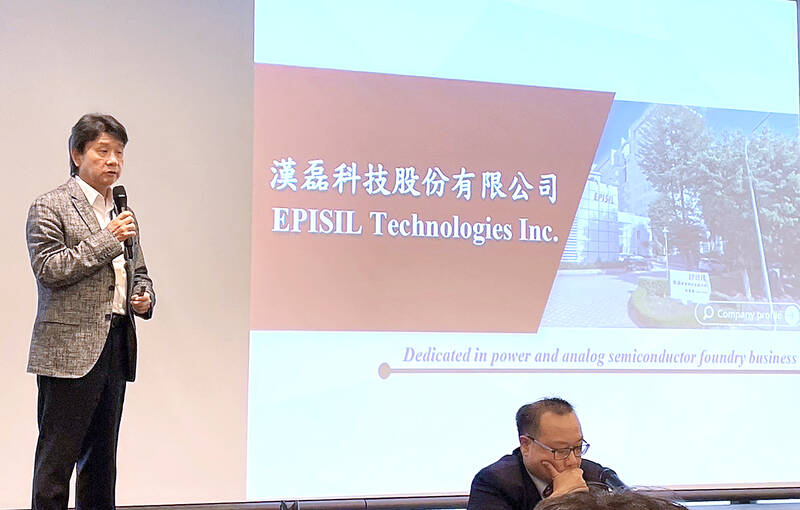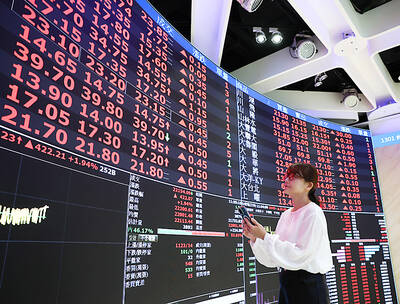Compound semiconductors maker Episil Technologies Inc (漢磊科技) yesterday said it aims to work with Vanguard International Semiconductor Corp (世界先進) to expand production of 8-inch silicon carbide wafers to an economic scale and strive to gain orders from global customers such as Japan’s Renesas Electronics Corp and Denso Corp.
The two firms on Tuesday signed an agreement to produce 8-inch silicon carbide wafers at a 6-inch fab operated by Episil. Vanguard also agreed to acquire a 13 percent stake in Episil for NT$2.48 billion (US$77.25 million).
Six-inch wafers remain a mainstream product in the silicon carbide market, but 8-inch wafers are expected to catch up in the next one to two years, Episil chairman Shyu Jann-hwa (徐建華) told investors.

Photo: CNA
The company’s move follows the step of major chipmakers such as Infineon Technology AG of Germany, which has opened a new 8-inch fab in Malaysia to produce silicon carbide wafers.
“We are optimistic about long-term demand for silicon carbide, although there is an oversupply, which we consider as a short-term issue,” Shyu said.
“With the use of silicon carbide gradually spreading from electric vehicles to home appliances, industrial devices and artificial intelligence data centers, it creates good business opportunities for foundry companies,” Shyu added.
Episil has failed to obtain orders from several global integrated-device manufacturers (IDM) as it lacks capacity, Shyu said.
The collaboration with Vanguard would help overcome this problem, he said, adding that the move is cost-efficient compared with building a new fab.
The 8-inch fab would operate a pilot line with a monthly capacity of 1,500 wafers before expanding to about 10,000 wafers over the next few years depending on customer demand, he added.
Episil is targeting Japanese IDMs such as Renesas Electronics, Denso and Toshiba Corp as potential customers, the company said.
Episil’s revenue in the first half of the year dropped 20.23 percent year-on-year to NT$2.94 billion as customers struggled with inventory issues, with silicon-based revenue tumbling 32 percent due to sagging demand from automotive and consumer electronics segments.
The company recorded a NT$212.28 million loss in the first half of the year, compared with a net profit of NT$91.94 million during the same period last year.
Episil swung into a loss of NT$0.64 per share in the first 6 months of this year, from earnings of NT$0.28 per share a year ago.
The company’s factory utilization rate would remain lower than 50 percent in the second half of this year, which would continue weighing on its gross margin because of higher depreciation costs from idled equipment, it said.
Gross margin dropped to 0.15 percent in the first half from 12.66 percent a year earlier.
The company expects business to improve in the fourth quarter thanks to stabilizing wafer pricing and an increase in customer demand, it said.
Wafer prices have fallen more than 30 percent since the beginning of this year, it added.

UNCERTAINTIES: Exports surged 34.1% and private investment grew 7.03% to outpace expectations in the first half, although US tariffs could stall momentum The Chung-Hua Institution for Economic Research (CIER, 中華經濟研究院) yesterday raised its GDP growth forecast to 3.05 percent this year on a robust first-half performance, but warned that US tariff threats and external uncertainty could stall momentum in the second half of the year. “The first half proved exceptionally strong, allowing room for optimism,” CIER president Lien Hsien-ming (連賢明) said. “But the growth momentum may slow moving forward due to US tariffs.” The tariff threat poses definite downside risks, although the scale of the impact remains unclear given the unpredictability of US President Donald Trump’s policies, Lien said. Despite the headwinds, Taiwan is likely

READY TO BUY: Shortly after Nvidia announced the approval, Chinese firms scrambled to order the H20 GPUs, which the company must send to the US government for approval Nvidia Corp chief executive officer Jensen Huang (黃仁勳) late on Monday said the technology giant has won approval from US President Donald Trump’s administration to sell its advanced H20 graphics processing units (GPUs) used to develop artificial intelligence (AI) to China. The news came in a company blog post late on Monday and Huang also spoke about the coup on China’s state-run China Global Television Network in remarks shown on X. “The US government has assured Nvidia that licenses will be granted, and Nvidia hopes to start deliveries soon,” the post said. “Today, I’m announcing that the US government has approved for us

When Lika Megreladze was a child, life in her native western Georgian region of Guria revolved around tea. Her mother worked for decades as a scientist at the Soviet Union’s Institute of Tea and Subtropical Crops in the village of Anaseuli, Georgia, perfecting cultivation methods for a Georgian tea industry that supplied the bulk of the vast communist state’s brews. “When I was a child, this was only my mum’s workplace. Only later I realized that it was something big,” she said. Now, the institute lies abandoned. Yellowed papers are strewn around its decaying corridors, and a statue of Soviet founder Vladimir Lenin

The National Stabilization Fund (NSF, 國安基金) is to continue supporting local shares, as uncertainties in international politics and the economy could affect Taiwanese industries’ global deployment and corporate profits, as well as affect stock movement and investor confidence, the Ministry of Finance said in a statement yesterday. The NT$500 billion (US$17.1 billion) fund would remain active in the stock market as the US’ tariff measures have not yet been fully finalized, which would drive international capital flows and global supply chain restructuring, the ministry said after the a meeting of the fund’s steering committee. Along with ongoing geopolitical risks and an unfavorable